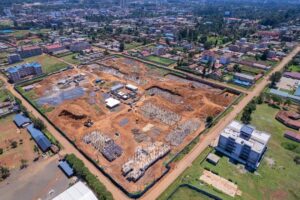CS Owalo – Development of 1,450 ICT Hubs in Wards to Commence in 2024

The Cabinet Secretary for Information, Communications and the Digital Economy, Eliud Owalo has announced that the development of 1,450 ICT hubs in all wards across the country will commence in 2024.
Speaking during the commemoration of ICT Authority’s 10th-anniversary event in Nairobi, CS Owalo underscored the need to develop the grassroots ICT sector which is vital in setting a stronger foundation of ICT-related development and the digital economy.
While assuring the stakeholders that the government is committed to delivering on the digital superhighway project, the CS noted that the move to create the ICT hubs in the wards will create job opportunities, especially for young people.
He said: “I can assure you that come the new year, you will not be seeing us in the offices. We shall be out there in the field rolling out the 1,450 digital hubs. With all government services available on the e-citizen platform and in consideration that we are out there training youth at the village level, we are determined to attain our digital economy dream.”
“Imagine at one digital hub, we are capable of creating 300 digital jobs. In a constituency that has an average of five wards, we are capable of creating 1,500 youths in the village. As much as these hubs will be domiciled in the village, the youth there shall be working with both national and international firms,” said CS Owalo adding that cooperation will be vital in attaining success.

“Let us work together to ensure so that we position Kenya effectively as the ICT hub of Africa and even globally, by way of comparative advantage,” added the CS.
On his part, ICT and the Digital Economy PS. Eng. John Tanui indicated that looking at the milestones attained in the last 10 years, 93 percent of this country is ready to be part of a data hub for this continent and the ICT hubs will play a key role in driving the industry ahead.
“We are well positioned in terms of connectivity and we need to drive our industry. We are confident that through the ICT Authority, we will do this and make the country proud,” said PS, Eng. Tanui.
During the event where the ICT Authority’s Staff were awarded, Stanley Kamanguya, CEO of the ICT Authority highlighted the key achievements of the Authority at 10 years which include but are not limited to the following;
Developed the Kenya National ICT Master Plan 2014 – 2017
Developed the Kenya National Digital Master Plan (2022-32)
Implemented the Kenya Digital Literacy Programme through which over one million digital devices have been installed in over 22,000 public primary schools in Kenya
Implementing the Presidential Digital Talent Programme through which over 2,900 interns have benefited.
Developed 12 ICT Standards which are now in their third edition.
Accredited ICT suppliers across the country
Conducted ICT conformity Audits across the Government
Revamped the E-citizen platform enabling easy access of government services for Kenyans.
Developed the Innovations Framework and put in place the Whitebox platform to support innovators across the country.
Implementing the Digital Signature launched in June 2023 by President William Ruto
Implementing the installation of the Government Public Wi-Fi service across the country
Implementing the delivery of ICT infrastructure across the country in line with the digital superhighway plans.

While thanking all partners who have worked with the Authority in attaining the milestones, Kamanguya noted that ideas such as the e-citizen were developed in partnership with other partners who continue to provide vital support in developing the ICT industry.
The gala dinner was also attended by former ICTA CEOs and Chairmen and supported by KCB Bank, Teltonika, Geonet, Fiber Home, Prime Telecoms, Convergence and Huawei.
The ICT Authority was founded as a State Corporation under the Ministry of Information Communication and Technology in August 2013. The Authority is tasked with rationalizing and streamlining the management of all Government of Kenya ICT functions. Its mandate entails enforcing ICT standards in Government and enhancing the supervision of its electronic communication alongside the promotion of ICT literacy, capacity, innovation, and enterprise.





